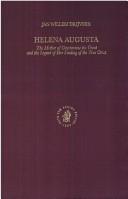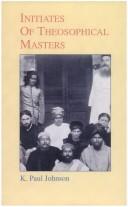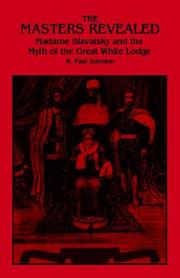| Listing 1 - 10 of 14 | << page >> |
Sort by
|

ISBN: 0801892376 1435691989 9780801892370 9781435691988 9780801879654 0801879655 080188635X 9780801886355 9780801886355 080188635X 0801879655 Year: 2007 Publisher: Baltimore, Md. London Johns Hopkins University Press
Abstract | Keywords | Export | Availability | Bookmark
 Loading...
Loading...Choose an application
- Reference Manager
- EndNote
- RefWorks (Direct export to RefWorks)

ISSN: 09208607 ISBN: 9004094350 9004246762 9789004094352 Year: 1992 Volume: 27 Publisher: Leiden ; New York : E.J. Brill,
Abstract | Keywords | Export | Availability | Bookmark
 Loading...
Loading...Choose an application
- Reference Manager
- EndNote
- RefWorks (Direct export to RefWorks)
This study on Flavia Julia Helena Augusta, mother of Constantine the Great, is divided into two parts. The purpose of the first part is to ascertain the facts of Helena's life on the basis of reliable historical sources. The second part deals with the legends concerning the discovery of the True Cross in Jerusalem by Helena. Fact and fiction, which are so often confused in the secondary literature, are carefully distinguished. The first part deals with subjects like Helena's life before the reign of Constantine, her residences in Trier and Rome, her conversion, her position at the court of Constantine, and her pilgrimage to the Holy Land. The second part investigates the origin, development and function of the legends of the discovery of the True Cross, which were developed in the 4th and 5th centuries: the Helena legend, the (Syriac) Protonike legend and the Judas Cyriacus legend. An appendix deals with the portraits of Helena.
Holy Cross --- Sainte Croix --- Legends --- Légendes --- Helena, --- Hélène, sainte (255-330) --- 7741 --- Helena --- -Cross --- Feast of the Cross --- Helena Saint --- Legends. --- -Legends --- Légendes --- Flavia Julia Helena, --- Helen, --- Елена, --- Elena, --- Hélène, --- Holy Cross - Legends --- Hélène, 255-330
Book
ISBN: 1316191559 1316189716 1316210057 1316206351 1107423325 1316202712 1139683632 1316208206 1316204553 1107073758 1322521964 Year: 2014 Publisher: Cambridge : Cambridge University Press,
Abstract | Keywords | Export | Availability | Bookmark
 Loading...
Loading...Choose an application
- Reference Manager
- EndNote
- RefWorks (Direct export to RefWorks)
Using Euripides' play Helen as the main point of reference, C. W. Marshall's detailed study expands our understanding of Athenian tragedy and provides new interpretations of how Euripides created meaning in performance. Marshall focuses on dramatic structure to show how assumptions held by the ancient audience shaped meaning in Helen and to demonstrate how Euripides' play draws extensively on the satyr play Proteus, which was part of Aeschylus' Oresteia. Structure is presented not as a theoretical abstraction, but as a crucial component of the experience of performance, working with music, the chorus and the other plays in the tetralogy. Euripides' Andromeda in particular is shown to have resonances with Helen not previously described. Arguing that the role of the director is key, Marshall shows that the choices that a director can make about role doubling, gestures, blocking, humour, and masks play a crucial part in forming the meaning of Helen.
Trojan War --- Women and literature --- Tragedy. --- Drama --- Literature and the war. --- Euripides. --- Helen, --- Elena, --- Helena, --- Helenē, --- Yelena, --- 海伦 , --- ヘレネー, --- הלנה, --- העלענע, --- 헬레네, --- Хелена, --- Єлена, --- Елена , --- هلن, --- هيلين, --- Ἑλένη, --- In literature.

ISBN: 0859916251 0585443602 9786610545384 184615006X 1280545380 9780859916257 9781846150067 Year: 2002 Publisher: Suffolk Boydell & Brewer
Abstract | Keywords | Export | Availability | Bookmark
 Loading...
Loading...Choose an application
- Reference Manager
- EndNote
- RefWorks (Direct export to RefWorks)
St Helena, mother of Constantine the Great and legendary finder of the True Cross, was appropriated in the middle ages as a British saint. The rise and persistence of this legend harnessed Helena's imperial and sacred status to portray her as a romance heroine, source of national pride, and a legitimising link to imperial Rome. This study is the first to examine the origins, development, political exploitation and decline of this legend, tracing its momentum and adaptive power from Anglo-Saxon England to the twentieth century. Using Latin, English, and Welsh texts, as well as church dedications and visual arts, the author examines the positive effect of the British legend on the cult of St Helena and the reasons for its wide appeal and durability in both secular and religious contexts. Two previously unpublished 'vitae' of St Helena are included in the volume: a Middle English verse 'vita' from the 'South English Legendary', and a Latin prose 'vita' by the twelfth-century hagiographer, Jocelin of Furness. ANTONINA HARBUS is a Research Fellow in the Department of English, University of Sydney.
Holy Cross --- Legends --- Helena, --- Flavia Julia Helena, --- Helen, --- Елена, --- Elena, --- Holy Cross - Legends --- Helena imperatrix --- Anglo-Saxon England. --- British saint. --- Church dedications. --- Constantine the Great. --- Imperial Rome. --- Legends. --- National pride. --- Romance heroine. --- St Helena. --- True Cross. --- Welsh texts.
Book
ISBN: 9780691165127 0691165122 0691202338 140087422X 9781400874224 Year: 2015 Publisher: Princeton, NJ
Abstract | Keywords | Export | Availability | Bookmark
 Loading...
Loading...Choose an application
- Reference Manager
- EndNote
- RefWorks (Direct export to RefWorks)
It's a familiar story: a beautiful woman is abducted and her husband journeys to recover her. This story's best-known incarnation is also a central Greek myth-the abduction of Helen that led to the Trojan War. Stealing Helen surveys a vast range of folktales and texts exhibiting the story pattern of the abducted beautiful wife and makes a detailed comparison with the Helen of Troy myth. Lowell Edmunds shows that certain Sanskrit, Welsh, and Old Irish texts suggest there was an Indo-European story of the abducted wife before the Helen myth of the Iliad became known. Investigating Helen's status in ancient Greek sources, Edmunds argues that if Helen was just one trope of the abducted wife, the quest for Helen's origin in Spartan cult can be abandoned, as can the quest for an Indo-European goddess who grew into the Helen myth. He explains that Helen was not a divine essence but a narrative figure that could replicate itself as needed, at various times or places in ancient Greece. Edmunds recovers some of these narrative Helens, such as those of the Pythagoreans and of Simon Magus, which then inspired the Helens of the Faust legend and Goethe. Stealing Helen offers a detailed critique of prevailing views behind the "real" Helen and presents an eye-opening exploration of the many sources for this international mythical and literary icon.
Abduction in literature --- Helen, --- In literature --- Abduction in literature. --- Literature. --- In literature. --- Helen, - of Troy, Queen of Sparta - In literature --- Elena, --- Helena, --- Helenē, --- Yelena, --- 海伦 , --- ヘレネー, --- הלנה, --- העלענע, --- 헬레네, --- Хелена, --- Єлена, --- Елена , --- هلن, --- هيلين, --- Ἑλένη, --- Helen, - of Troy, Queen of Sparta
Book
ISBN: 0874776880 9780874776881 Year: 1993 Publisher: New York Putnam's Sons
Abstract | Keywords | Export | Availability | Bookmark
 Loading...
Loading...Choose an application
- Reference Manager
- EndNote
- RefWorks (Direct export to RefWorks)
Esoteric sciences --- Blavatsky, Helena Petrovna --- Theosophists --- Theosophy --- Théosophes --- Théosophie --- Biography --- History --- Biographie --- Histoire --- Blavatsky, H. P. --- Biography. --- History. --- -Theosophy --- -Cosmology --- Religions --- Anthroposophy --- Religious adherents --- -Biography --- Théosophes --- Théosophie --- Blavat︠s︡kai︠a︡, Elena Petrovna, --- Radda-Baĭ, --- Blavatski, H. P., --- Blavatski, Yelena Petrovna, --- Blavatsky, Helene Petrovna Hahn-Hahn, --- H. P. B. --- HPB --- B., H. P. --- Blavatsky, Helena Petrovna, --- Blavatskai︠a︡, E. P. --- Блаватская, Елена, --- Блаватская, Е. П., --- Блаватская, Е. П. --- Blavatsky, Helena, --- Blavatsky, --- Theosophists - Biography. --- Theosophy - History.
Book
ISBN: 9783110316353 3110316358 9783110411621 9783110411577 311041158X 3110411571 Year: 2016 Volume: 2019 Publisher: Berlin Boston
Abstract | Keywords | Export | Availability | Bookmark
 Loading...
Loading...Choose an application
- Reference Manager
- EndNote
- RefWorks (Direct export to RefWorks)
Donadi’s edition of Gorgias’ Helenae encomium takes into account the entire manuscript tradition of this work, offering definitive readings of many obscure passages. The new text goes beyond the schematic distinction between the Ms. Burneianus A and the Ms. X (Palatinus 88) offered by other current editions.
Gorgias, --- Helen, --- Helena --- Grekisk panegyrik --- Grekisk litteratur --- Greek literature --- Grekisk panegyrik. --- Grekisk litteratur. --- Greek literature. --- Elena, --- Helena, --- Helenē, --- Yelena, --- 海伦 , --- ヘレネー, --- הלנה, --- העלענע, --- 헬레네, --- Хелена, --- Єлена, --- Елена , --- هلن, --- هيلين, --- Ἑλένη, --- Literature, Ancient. --- Antike Rhetorik. --- Gorgias. --- Helen. --- Helena. --- Lobrede. --- ancient rhetoric. --- encomium. --- LITERARY COLLECTIONS / Ancient & Classical. --- Helenēs enkōmion (Gorgias, of Leontini) --- Gorgiou Helenēs enkōmion (Gorgias, of Leontini) --- Encomium of Helen (Gorgias, of Leontini) --- Encomium in Helenam (Gorgias, of Leontini)

ISBN: 0585045992 9780585045993 079142555X 0791425568 1438407955 Year: 1995 Publisher: [Place of publication not identified] State University of New York Press
Abstract | Keywords | Export | Availability | Bookmark
 Loading...
Loading...Choose an application
- Reference Manager
- EndNote
- RefWorks (Direct export to RefWorks)
Theosophists --- Theosophy --- Great White Brotherhood --- Religion --- Philosophy & Religion --- Islam --- Cults --- Religious adherents --- Biography --- History --- Blavatsky, H. P. --- Friends and associates. --- Blavat︠s︡kai︠a︡, Elena Petrovna, --- Radda-Baĭ, --- Blavatski, H. P., --- Blavatski, Yelena Petrovna, --- Blavatsky, Helene Petrovna Hahn-Hahn, --- H. P. B. --- HPB --- B., H. P. --- Blavatsky, Helena Petrovna, --- Blavatskai︠a︡, E. P. --- Блаватская, Елена, --- Блаватская, Е. П., --- Блаватская, Е. П. --- Blavatsky, Helena, --- Blavatsky, --- Great White Brotherhood. --- History.

ISBN: 0585044864 9780585044866 0791420639 0791420647 1438407963 9780791420645 Year: 1994 Publisher: Albany : State University of New York Press,
Abstract | Keywords | Export | Availability | Bookmark
 Loading...
Loading...Choose an application
- Reference Manager
- EndNote
- RefWorks (Direct export to RefWorks)
Great White Brotherhood. --- Theosophy --- Theosophists. --- Religious adherents --- Cults --- History. --- Blavatsky, H. P. --- Blavat︠s︡kai︠a︡, Elena Petrovna, --- Radda-Baĭ, --- Blavatski, H. P., --- Blavatski, Yelena Petrovna, --- Blavatsky, Helene Petrovna Hahn-Hahn, --- H. P. B. --- HPB --- B., H. P. --- Blavatsky, Helena Petrovna, --- Blavatskai︠a︡, E. P. --- Блаватская, Елена, --- Блаватская, Е. П., --- Блаватская, Е. П. --- Blavatsky, Helena, --- Blavatsky, --- Theosophy - History. --- esotericism --- The Theosophical Society --- Helena P. Blavatsky --- spirituality --- theosophical history --- Madame Blavatsky --- The Great White Lodge --- occult masters
Book
ISBN: 9783110626124 9783110626483 3110626489 3110626128 Year: 2019 Publisher: Berlin Boston
Abstract | Keywords | Export | Availability | Bookmark
 Loading...
Loading...Choose an application
- Reference Manager
- EndNote
- RefWorks (Direct export to RefWorks)
This monograph lays the groundwork for a new approach of the characterization of the Homeric Helen, focusing on how she is addressed and named in the Iliad and the Odyssey and especially on her epithets. Her social identity in Troy and in Sparta emerges in the words used to address and name her. Her epithets, most of them referring to her beauty or her kinship with Zeus and coming mainly from the narrator, make her the counterpart of the heroes.
Epic poetry, Greek --- History and criticism --- Homer --- Helen, --- Elena, --- Helena, --- Helenē, --- Yelena, --- 海伦 , --- ヘレネー, --- הלנה, --- העלענע, --- 헬레네, --- Хелена, --- Єлена, --- Елена , --- هلن, --- هيلين, --- Ἑλένη, --- Homerus --- Hóiméar --- Hūmīrūs --- Homeros --- Gomer --- Omir --- Omer --- Omero --- Ho-ma --- Homa --- Homérosz --- האמער --- הומירוס --- הומר --- הומרוס --- هومر --- هوميروس --- 荷马 --- Ὅμηρος --- Гамэр --- Hamėr --- Омир --- Homère --- Homero --- 호메로스 --- Homerosŭ --- Homērs --- Homeras --- Хомер --- ホメーロス --- ホメロス --- Гомер --- Homeri --- Hema --- Pseudo-Homer --- Pseudo Omero --- Characters --- Helen. --- Language. --- In literature.
| Listing 1 - 10 of 14 | << page >> |
Sort by
|

 Search
Search Feedback
Feedback About UniCat
About UniCat  Help
Help News
News